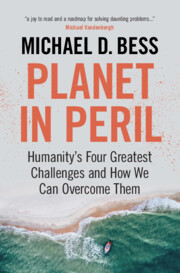Book contents
- Planet in Peril
- Reviews
- Planet in Peril
- Copyright page
- Dedication
- Epigraph
- Contents
- Fictional Vignettes
- Acknowledgements
- 1 Introduction
- Part I Existential Threats: The Four Most Pressing Dangers Facing Humankind
- 2 Fossil Fuels and Climate Change
- 3 Nukes for War and Peacetime
- 4 Pandemics, Natural or Bioengineered
- 5 Artificial Intelligence: Extreme Reward and Risk
- Part II Strategies and Obstacles: The Solutions We Need, and What’s Preventing Them from Being Realized
- Part III Sensible Steps for Today’s World: Powerful Measures We Can Implement Right Away
- Part IV The Middle-Term Goal: New International Tools for the Late Twenty-First Century
- Part V The Long-Term Goal: Envisioning a Mature System of Global Governance for the Twenty-Second Century
- Endnotes
- Bibliography
- Index
2 - Fossil Fuels and Climate Change
from Part I - Existential Threats: The Four Most Pressing Dangers Facing Humankind
Published online by Cambridge University Press: 13 October 2022
- Planet in Peril
- Reviews
- Planet in Peril
- Copyright page
- Dedication
- Epigraph
- Contents
- Fictional Vignettes
- Acknowledgements
- 1 Introduction
- Part I Existential Threats: The Four Most Pressing Dangers Facing Humankind
- 2 Fossil Fuels and Climate Change
- 3 Nukes for War and Peacetime
- 4 Pandemics, Natural or Bioengineered
- 5 Artificial Intelligence: Extreme Reward and Risk
- Part II Strategies and Obstacles: The Solutions We Need, and What’s Preventing Them from Being Realized
- Part III Sensible Steps for Today’s World: Powerful Measures We Can Implement Right Away
- Part IV The Middle-Term Goal: New International Tools for the Late Twenty-First Century
- Part V The Long-Term Goal: Envisioning a Mature System of Global Governance for the Twenty-Second Century
- Endnotes
- Bibliography
- Index
Summary
Tapping the power of fossil fuels over the past century and a half has propelled a massive expansion of human enterprise and prosperity, yet it has also released toxic amounts of carbon dioxide into the atmosphere, thereby endangering the future viability of human civilization. If global average temperatures rise 4 to 6 degrees above the level of preindustrial times, climate scientists nearly unanimously conclude that severe disruptions of global ecosystems will result. These disruptions include: self-reinforcing spirals of global warming caused by feedback factors like melting permafrost, ice loss, water vapor, and wildfires; acidification of ocean waters and flooding of coastal regions as sea level rises by as much as one foot per decade; growing frequency of severe weather events such as droughts, floods, superstorms, and heat waves; the spread of tropical diseases into temperate regions; and the collapse of agriculture in many parts of the planet, leading to waves of desperate climate refugees.
Keywords
- Type
- Chapter
- Information
- Planet in PerilHumanity's Four Greatest Challenges and How We Can Overcome Them, pp. 27 - 35Publisher: Cambridge University PressPrint publication year: 2022

